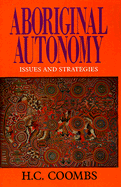Book contents
- Frontmatter
- Contents
- Foreword by Michael Dodson
- Preface
- Acknowledgments
- The Aboriginal World View
- Aborigines and the Land
- Aboriginal Lifestyles
- Aborigines, Resources and Development
- Aborigines, Law and the State
- Asserting Autonomy: Recent Aboriginal Initiatives
- The Recognition of Native Title
- Conclusion
- 18 Negotiating future autonomy
- Appendix: The Eva Valley Statement
- References
- Select Bibliography of work by H.C. Coombs
- Index
18 - Negotiating future autonomy
Published online by Cambridge University Press: 03 May 2011
- Frontmatter
- Contents
- Foreword by Michael Dodson
- Preface
- Acknowledgments
- The Aboriginal World View
- Aborigines and the Land
- Aboriginal Lifestyles
- Aborigines, Resources and Development
- Aborigines, Law and the State
- Asserting Autonomy: Recent Aboriginal Initiatives
- The Recognition of Native Title
- Conclusion
- 18 Negotiating future autonomy
- Appendix: The Eva Valley Statement
- References
- Select Bibliography of work by H.C. Coombs
- Index
Summary
THE ABORIGINAL DESIRE FOR AUTONOMY
Ideally, this final chapter should return to the two themes which seem to me to dominate Aboriginal society, their ways of thought and their plans for the future. These are, firstly, the autonomy which they see as vital to their own personal existence and, secondly, the reciprocal obligation to nurture and care for others within the social groups in which their Aboriginal identity will emerge and develop. Contemporary Aboriginal history can be viewed as a continuing effort to balance the personal and group tensions inherent in these two key principles of autonomy and nurture, and to realise and maintain them in the colonised pattern of life which dispossession has imposed on that history. The earlier chapters of this book, I believe, demonstrate that Aboriginal society remains strongly committed to the pursuit of autonomy for its people in their diverse individual and corporate lives, and to the acceptance of respect, responsibility and accountability for the rights and autonomy of others.
The events and initiatives described in these chapters demonstrate that in the years since the apparent ‘consensus’ in approach by the Whitlam and Fraser Governments, the direction of change has inexorably been towards greater independence for Aboriginal Australians. Despite the repudiation of that ‘consensus’, Aborigines have made by their own initiatives, intelligence and dedication, remarkable progress in the achievement of a lifestyle more healthy, more creative and more characteristically Aboriginal than has previously been possible since their dispossession.
- Type
- Chapter
- Information
- Aboriginal AutonomyIssues and Strategies, pp. 220 - 230Publisher: Cambridge University PressPrint publication year: 1994



